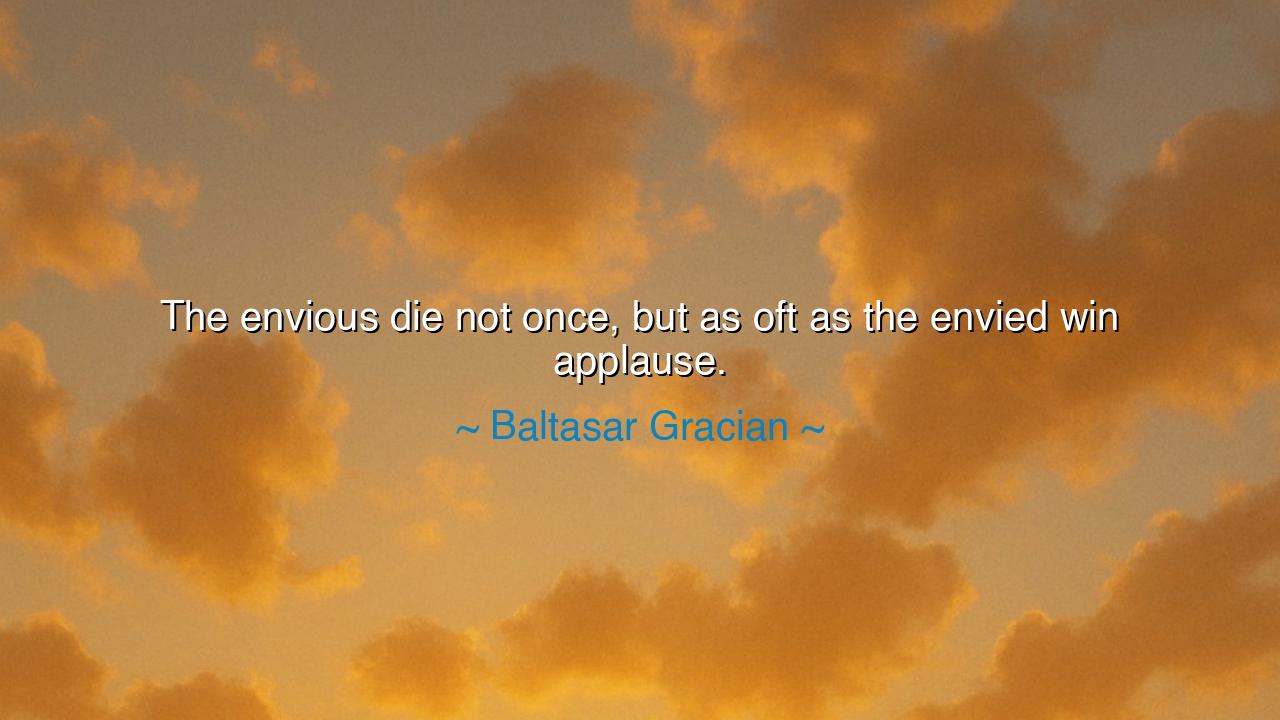
The envious die not once, but as oft as the envied win applause.






There are truths that cut like blades through the illusions of the human heart, and among them stands the fierce wisdom of Baltasar Gracián, the Spanish philosopher and moralist of the seventeenth century, who wrote: “The envious die not once, but as oft as the envied win applause.” In this single line, Gracián captures the eternal torment of envy—a fire that burns not in the body but in the soul. The envious are not destroyed by others, but by themselves; every triumph of another becomes a new wound, every act of praise for another’s success a dagger to their peace. Thus, while the envied live once in glory, the envious perish a thousand quiet deaths in secret bitterness.
To understand this saying, we must first understand the nature of envy itself. It is not mere dissatisfaction or longing—it is sorrow at another’s joy, resentment at another’s virtue, and pain at another’s success. The envious person cannot rejoice in beauty, genius, or triumph unless it belongs to him. When others receive honor, his heart contracts; when others rise, he feels diminished. Gracián knew this poison well, for he lived in a world of courts and clergy, where ambition whispered in every corridor and pride dressed itself as piety. In that world, men smiled outwardly while bleeding inwardly, their hearts consumed not by failure, but by the sight of others succeeding. To such men, applause is not music, but thunder—the sound that shakes the fragile house of their self-worth.
Gracián’s wisdom was born from the spiritual discipline of observation. As a Jesuit and a thinker, he saw that envy was not simply a moral weakness, but a spiritual disease. The envious man creates his own hell long before death, for he relives it each time another shines. Unlike hatred, which exhausts itself in a single outburst, envy is endless resurrection of sorrow—a chain of self-inflicted wounds. Every time the world celebrates someone else, the envious man feels his own worth decay. His life becomes a graveyard of applause, each cheer a tolling bell that reminds him of his own perceived inadequacy.
History offers many mirrors of this truth. Consider Salieri, the accomplished composer who lived alongside Mozart. Salieri was a man of talent and honor, yet when confronted with Mozart’s divine genius, he could not bear it. Each note of Mozart’s music was to him both miracle and torment. The applause Mozart received became Salieri’s slow death, his own admiration poisoned by jealousy. He did not suffer one tragic fall, but countless small deaths of spirit, as Gracián foretold. The envy he nurtured devoured him from within, while Mozart, even in struggle, lived free in the joy of creation. Such is the fate of the envious—they die each time another succeeds, while the envied, though often unaware, live on in the radiance of their own light.
Gracián’s insight is not merely condemnation; it is also instruction. He teaches us that envy is self-destruction disguised as resentment. The cure lies not in silencing applause, but in transforming one’s perception of it. The wise do not wither in the light of others; they grow from it. To hear another praised should awaken admiration, not agony; inspiration, not despair. For the world’s greatness does not subtract from our own—it multiplies it. The man who learns to celebrate another’s success has already conquered himself. The one who learns from the envied becomes, in time, enviable for his humility and growth.
The ancients understood this as the discipline of the noble spirit. Marcus Aurelius, the philosopher-emperor, wrote that “the happiness of your life depends upon the quality of your thoughts.” The envious man, chained to bitterness, imprisons himself in misery. But the one who turns envy into emulation transforms poison into power. Instead of mourning another’s triumph, he studies it, learns from it, and seeks his own path to excellence. Thus, envy becomes the teacher of ambition purified by wisdom.
The lesson of Gracián’s words is therefore profound and practical: guard your heart against envy as you would against disease. When others receive applause, let your soul rejoice, for their achievement is proof of what is possible. Do not measure your worth by comparison, but by your devotion to your own calling. When envy whispers, answer it with gratitude; when jealousy burns, quench it with admiration. Remember that every man’s glory is his own destiny, and your light will come in its time.
And so, let Gracián’s wisdom stand as a mirror for all generations: “The envious die not once, but as oft as the envied win applause.” The envious are slain not by others, but by their own hearts. The envied live once in triumph; the envious perish daily in regret. Therefore, choose admiration over resentment, learning over bitterness, and peace over pride. For to rejoice in another’s greatness is to share in the immortality of human achievement—and in that joy, one lives not in death, but in light everlasting.






AAdministratorAdministrator
Welcome, honored guests. Please leave a comment, we will respond soon